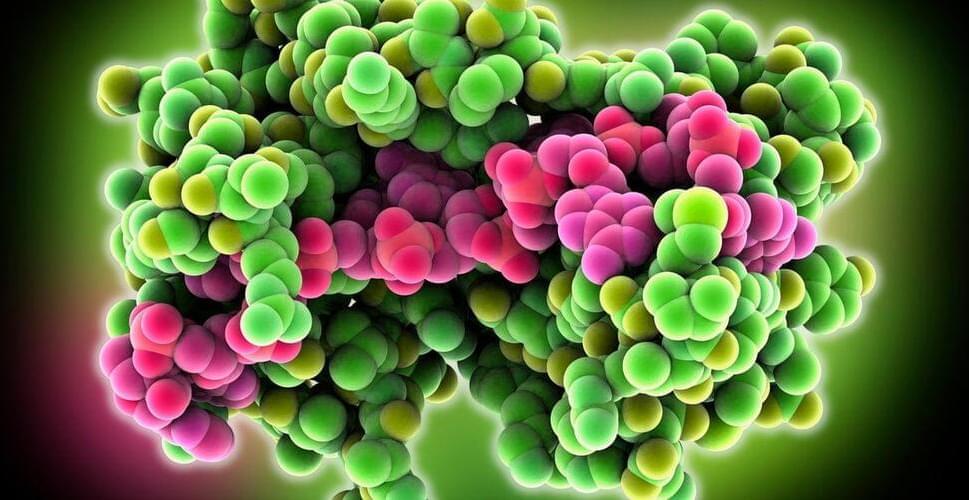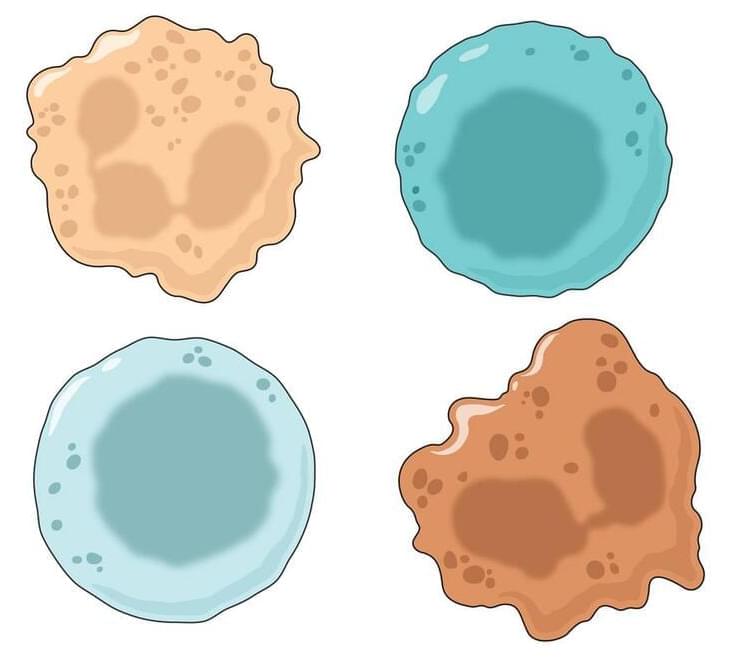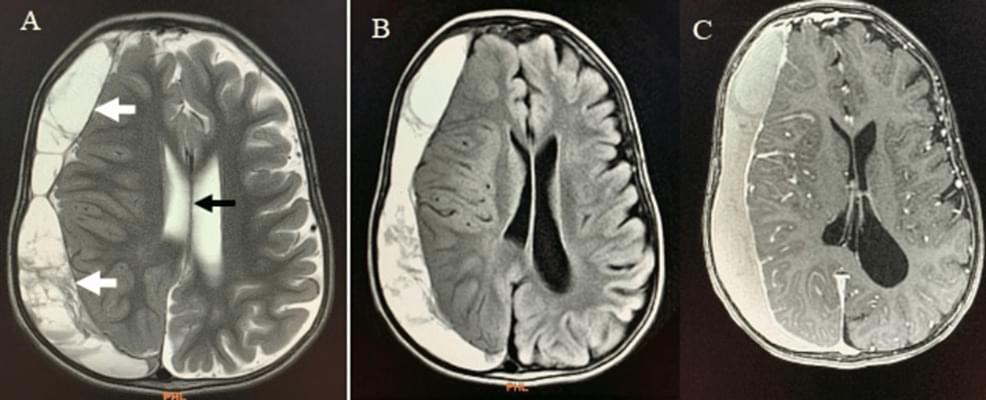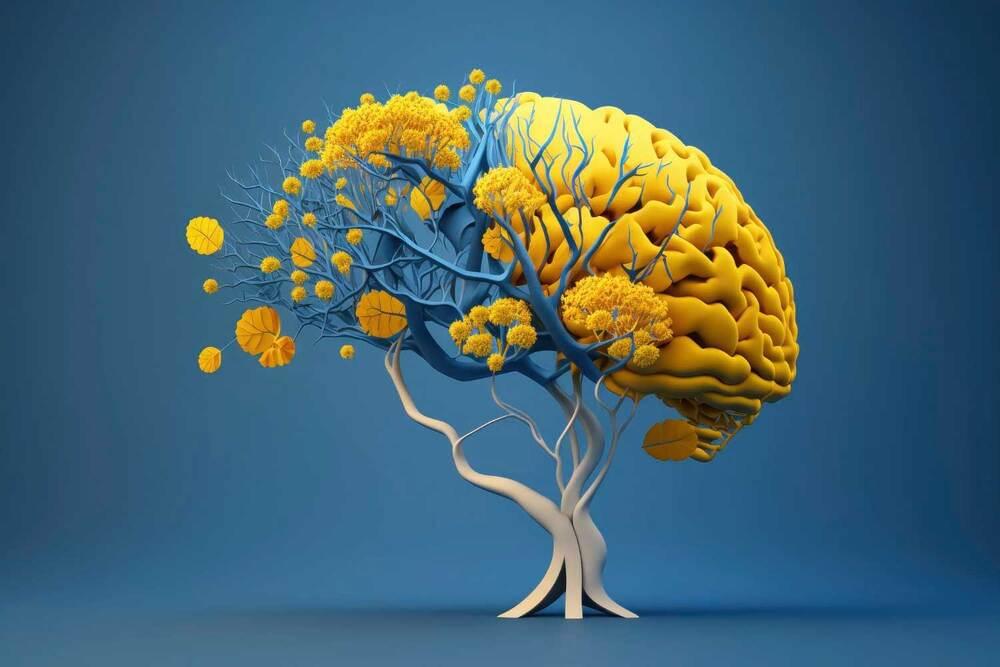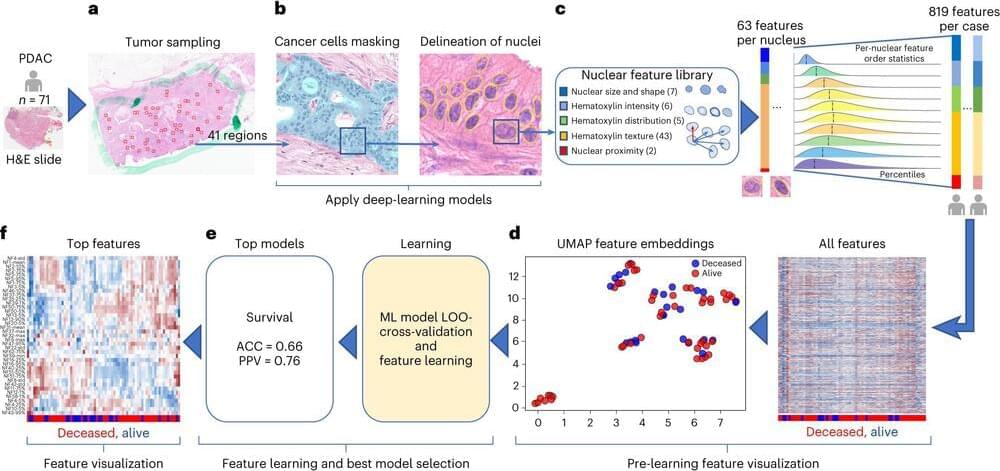Archive for the ‘biotech/medical’ category: Page 272
Jan 23, 2024
Giant project will chart human immune diversity to improve drugs and vaccines
Posted by Shubham Ghosh Roy in category: biotech/medical
Study finds measuring levels of a protein could be just as good at detecting disease as lumbar punctures.
Jan 22, 2024
Large Head in Asymptomatic Child: A Subtle Presentation of Connective Tissue Disorder With Spontaneous Significant Intracerebral Bleed
Posted by Shubham Ghosh Roy in categories: biotech/medical, neuroscience
Three years old boy with reassuring development had presented to the Pediatric Neurology clinic with a referral due to a large head. Occipito-frontal circumference was more than 97th centile with an unremarkable neurological examination. MRI brain exhibited an acute on chronic large right frontoparietal subdural hematoma with prominent mass effect. Consequentially, the hematoma was evacuated by the neurosurgeon. Postoperative recovery stayed satisfactory. Hematology workup showed normal coagulation and clotting factors levels. Whole exome sequencing (WES) study revealed heterozygous variant c.5187G>A p.(Trp1729• in gene FBN1 — pathogenic for Marfan syndrome. However, this variant has not yet been reported in association with cerebral arteritis/intracerebral bleed. On follow-up, the child remained asymptomatic clinically with static head size.
Jan 22, 2024
Computational Capabilities That Will Transform the World
Posted by Chuck Brooks in categories: biotech/medical, chemistry, cyborgs, internet, quantum physics, robotics/AI
By Chuck Brooks
Computing paradigms as we know them will exponentially change when artificial intelligence is combined with classical, biological, chemical, and quantum computing. Artificial intelligence might guide and enhance quantum computing, run in a 5G or 6G environment, facilitate the Internet of Things, and stimulate materials science, biotech, genomics, and the metaverse.
Computers that can execute more than a quadrillion calculations per second should be available within the next ten years. We will also rely on clever computing software solutions to automate knowledge labor. Artificial intelligence technologies that improve cognitive performance across all envisioned industry verticals will support our future computing.
Continue reading “Computational Capabilities That Will Transform the World” »
Jan 22, 2024
Researchers discover new virus warrior slaying deadly superbug in sleep
Posted by Gemechu Taye in category: biotech/medical
The new virus is thought to eliminate dormant bacteria, providing significant hope against the predicted 10 million annual deaths expected by 2050.
When bacteria encounter a lack of nutrients or experience stress induced by the antibiotics, they undergo a regulated shutdown of their metabolism, entering a dormant resting state.
This ETH Zurich-led discovery significantly advances addressing the global superbug crisis.
Continue reading “Researchers discover new virus warrior slaying deadly superbug in sleep” »
Jan 22, 2024
More Mars and Moon Water Found
Posted by Greg Allison in categories: biotech/medical, education, health

See why new discoveries about water on Mars and water on the Moon are great news for the future of space settlement!
Outstanding Antioxidant For Your Health: https://shopc60.com/
Use discount code: GreenGregs10 for 10% off.
These statements and products have not been evaluated by the Food and Drug Administration. This product is not intended to diagnose, treat, cure, prevent, or mitigate any disease.
Jan 22, 2024
Harvard Scientists Discover Surprising Hidden Catalyst in Human Brain Evolution
Posted by Genevieve Klien in categories: biotech/medical, evolution, food, neuroscience
The study hypothesizes that ‘pre-digested’ foods contributed to the development of larger brains. The large, capable human brain is a marvel of evolution, but how it evolved from a smaller primate brain into the creative, complex organ of today is a mystery. Scientists can pinpoint when our evolutionary ancestors evolved larger brains, which roughly tripled in size as human ancestors evolved from the bipedal primates known as Australopithecines.
Jan 22, 2024
New cause of neuron death in Alzheimer’s discovered
Posted by Genevieve Klien in categories: biotech/medical, neuroscience
Jan 22, 2024
Research team develops new tools to improve pancreatic cancer patient care
Posted by Shubham Ghosh Roy in categories: biotech/medical, robotics/AI
Cedars-Sinai Cancer investigators have used a unique precision medicine and artificial intelligence (AI) tool called the Molecular Twin Precision Oncology Platform to identify biomarkers that outperform the standard test for predicting pancreatic cancer survival. Their study, published in Nature Cancer, demonstrates the viability of a tool that could one day guide and improve treatment for all cancer patients.
“Molecular Twin, which we developed at Cedars-Sinai, can be used to study any tumor type, including pancreatic cancer, which is notoriously difficult to treat,” said Dan Theodorescu, MD, Ph.D., director of Cedars-Sinai Cancer and the PHASE ONE Foundation Distinguished Chair, and senior author of the study. “Using our Molecular Twin technology, we anticipate creating tests that can be used even in locations that lack access to advanced resources and technology, pairing patients with the most effective therapies and expanding the availability of precision medicine.”
Investigators used the Molecular Twin platform to analyze blood and tissue samples from 74 patients with the most common and most aggressive pancreatic cancer type, pancreatic ductal adenocarcinoma. The disease begins in the cells lining ducts that carry digestive enzymes from the pancreas to the small intestine.
 „Summa Technologie is a „mother-essay from which most of Lem’s later essayistic books stem. It was written in times when most of the discussed issues – today sometimes quite obvious ones – belonged to the world of fantasy. The ambition behind this project still amazes, especially if we take into consideration that Lem tried to set up a secular edifice of knowledge, competing in its universalism with Saint Thomas Aquinas and his Summa Theologica.
„Summa Technologie is a „mother-essay from which most of Lem’s later essayistic books stem. It was written in times when most of the discussed issues – today sometimes quite obvious ones – belonged to the world of fantasy. The ambition behind this project still amazes, especially if we take into consideration that Lem tried to set up a secular edifice of knowledge, competing in its universalism with Saint Thomas Aquinas and his Summa Theologica.
At the same time the book rivals world futurology — in the domain of foreseeing future ways of science and technology. Current generation, interested in biotechnology and informatics, shall find in Lem’s “Summa” the project and prophecy of todays’ successes of these disciplines.
The English translation (University Of Minnesota Press, 2013) is the work of Joanna Zylinska, professor of new media and communications at Goldsmiths, University of London.
